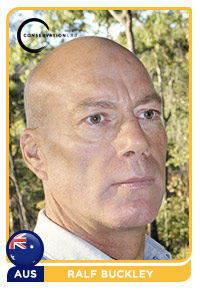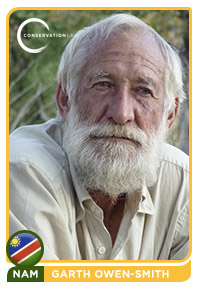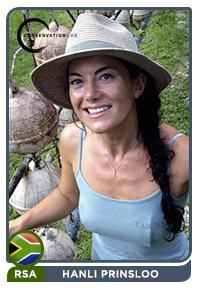CONSERVATION LAB 2016: MEET OUR LATEST STAR PLAYERS
It’s half time in the fight for conservation. So far, the game hasn’t gone our way – even as we speak, entire species are in danger of being lost altogether and the opposition comes at us from all sides.
But it’s not too late to turn things around. It became clear from the half-day Conservation Lab, originally featured as part of the official We Are Africa programme, that we’ve already got the players and the skills. We just need to regroup, find some self belief and work together to win Africa’s conservation challenges.
Enter the newly reimagined Conservation Lab: a progressive two-day un-conference event of its own, created to bring together 50 influencers in the travel industry with 50 luminaries from the conservation world under optimal conditions for creative thinking and collaborative innovation.
So far, the squad is shaping up nicely. If you want to make the team, apply now or contact ryan@beyondluxury.com for more information. In the meantime, meet our newest star players sign-ups…
 Star Player:
Star Player:
Prof Ralf Buckley, International Chair in Ecotourism Research at Griffith University
Team nickname:
The Prof
Nationality:
Australian
In three words…
Analytical, international, outdoors
Conservation hero:
There are innumerable unsung conservation heroes: rangers; anti-poaching crews; undercover agents; campaigners. Right now I’ll list Les Carlisle, Map Ives, and Dereck and Beverly Joubert.
Current conservation project/s:
We are a research group, so we are always running multiple projects at the same time. We have just published work on: grand challenges for conservation world-wide; management of over 1000 parks in China; the role of tourism in conservation of African big cats; the decision-making processes of travel agents in luxury wildlife tourism; the net quantitative effects of ecotourism on extinction risks for various threatened species, etc. In recent years we have also published research on: the proportions of IUCN Redlisted mammal, bird and amphibian species, whose conservation is funded through ecotourism; the role of tourism in protecting Bengal tigers against poaching; the pros and cons of hunting tourism for various species, etc. In 2010 we published the world’s first book on Conservation Tourism.
Greatest conservation achievement:
I am generally an analyst rather than an activist, so most of my contributions are in assessing and publicising others’ achievements rather than my own. However, I have also been involved in numerous intergovernmental agencies, parliamentary inquiries, and active conservation campaigns over the years, successfully opposing high-impact mining-industry or infrastructure-development proposals inside public national parks. I have also been involved in developing environmental policy and legislation related to international trade and investment, impact assessment for various industries, and pollution control. And I have also taught many undergraduate and executive courses in various aspects of environmental management and conservation, including the role of ecotourism. So I would say it is a career portfolio rather than any notable achievement!
How can we play to win the conservation game?
We are players in a real-life political game, with powerful opponents. We need strategy, allies, and firepower. There is no magic bullet: we are fighting on different fronts using different approaches, and we need immediate anti-poaching actions, as well as campaigns to win global hearts and minds. We will take losses along the way, but gain allies. Finally, we cannot ignore global population increase, development and climate change – unless those are checked, everything else will ultimately be fruitless. But take heart;”without courage, all other virtues are useless.”
 Star Player:
Star Player:
Aleksandra Orbeck-Nilssen, Ceo & Founder of Nanofasa Namibia Trust (www.nanofasa.com)
Team nickname:
The Gatherer
Nationality:
Norwegian
In three words…
Innovative, persistent, wild
Conservation hero:
The Ju´/hoansi San people
Current conservation project/s:
I run an organisation, Nanofasa Namibia Trust, in Namibia working with the San people. Nanofasa works to ensure healthy and productive interactions between nature, adventure, culture and communities. Improved human wellbeing and ecosystem health is essential for the sustainability of our planet and its people. We run many different spin-off projects: The Barefoot Academy; Adventure student project (people who come to learn about nature and culture from our San mentors); The What About Water project; and the Wild at Research project, which is a research and tracking project where we strive to ensure the general ecosystem health in the last wild zone in the North East of Namibia.
Greatest conservation achievement:
One of the most successful projects of Nanofasa is The Barefoot Academy: a project created in conjunction with the communities themselves, where we base the project on their interests and knowledge and create a local offering where they can excel in their area of interest, and at the same time ensure the sustainability of their environment and future generations.
The Barefoot Academy is designed as a project that not only conserves the nature, wildlife and resources that the communities and their livelihoods depend upon; but it will also promote local engagement, cultural sustainability and tradition-based education and work creation for women, men and unemployed youth. They get full traditional educational training by their elders and will be able to receive a qualification certificate, though Cybertracking, that enables them to become trackers, vegetation assessors, guides, mentors or traditional teachers, shoe cobblers and assist the Nanofasa research team with wildlife tracking, botany and how to keep the nature and resources that they depend upon alive. It is all about creating a local offering.
How can we play to win the conservation game?
If we want to protect ecosystems, we must become one. For true development to take place, we need to nurture, protect and preserve not only our natural environment and wildlife, but also our people, their culture and customs through equality. We are all the key to a sustainable future.
 Star Player:
Star Player:
Garth Owen-Smith, Trustee and Consultant for IRDNC
Team nickname:
Field conservationists
Nationality:
Namibian
In three words…
Committed to c.b.n.r.m. (community-based natural resource management)
Conservation hero:
I believe in mentoring and was fortunate to have a number of superb mentors along the way.
Current conservation project/s:
Re-engaging community leaders and communities in stopping rhino poaching in Kunene Region of Namibia; also working with issues around desert-adapted elephant and lion.
Greatest conservation achievement:
Helping to pioneer the practical application of community-based conservation and never giving up.
How can we play to win the conservation game?
It’s all about relationships. The long-term conservation of wildlife will not be achieved by military tactics, on computer screens or at workshops, but by field conservationists who build relationships with the people living with wildlife or around our national parks.
 Star Player:
Star Player:
Hanli Prinsloo, Founder & CEO of I AM WATER Ocean Conservation
Team nickname:
The Fish
In three words…
Honest, passionate, aquatic
Conservation hero:
Dr Sylvia Earle and Jane Goodall
Current conservation project/s:
I run the I AM WATER Ocean Conservation Foundation – we believe in ocean conservation through human experience and we work under the ethos of, ‘you protect what you love and you love what you have experienced’. We are all water and we all share the opportunity and challenge to protect our last wilderness beneath the waves. I AM WATER does this through education, awareness and advocacy with a focus on innovative ocean workshops offered to underserved coastal communities globally, as well as bespoke ocean adventures for paying clients serving as a form of sustainable fundraising.
Greatest conservation achievement:
Seeing the kids in our projects go from distrusting the ocean to feeling total connection and the desire to protect it. Through our programmes, hundreds of children have learnt to love and respect the ocean, as well as grow into kinder, more responsible humans.
How can we play to win the conservation game?
Humans are the biggest problem our planet faces; BUT we are also the only solution. We know enough (the research is there) and we have enough (the resources are there) to create real change in how we impact the natural world. What we need more of are individuals (both in powerful and in grassroot positions) to take responsibility for their blue or green backyard. We need to rekindle the deep connection our species once had with wilderness to see this happen… And whatever happens, we cannot give up hope.
If you want to be part of the Conservation Lab 2016, apply now or contact ryan@beyondluxury.com for more information.











